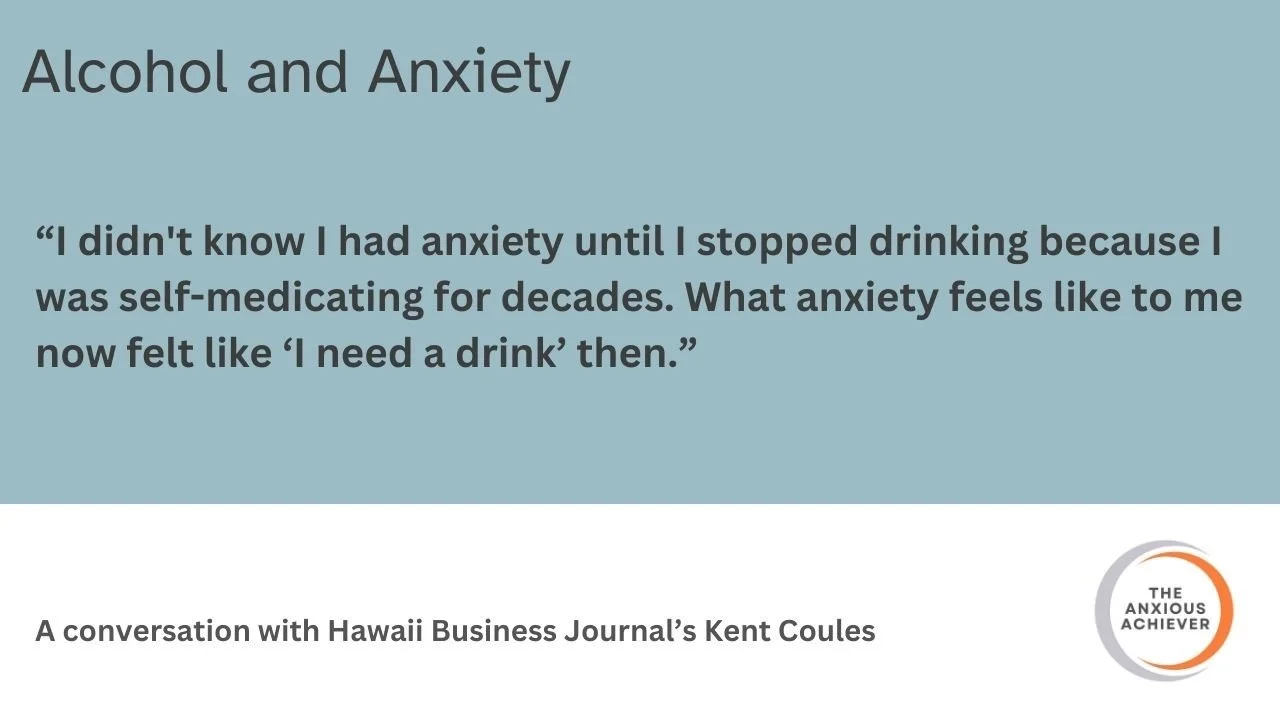Alcohol and Anxiety: A Common Pair
After a speech in Honolulu last year, a man came up to me during the book signing and said something I will never forget. It was this: “I didn't realize I had been fighting anxiety all my life until I gave up drinking 15 years ago.” That man is Kent Coules, the Co-Publisher of Hawaii Business Magazine. I interviewed Kent on The Anxious Achiever and I’ve included an edited version of our conversation below. People use alcohol to avoid anxiety all the time. I certainly do. Nearly every social function has booze. It's become such an accepted lubricant that we forget what a powerful drug it is.
Morra: If you had been raised in a world where feeling your feelings felt comfortable and normal, and you had words to put around them, would something have been different about your turning to alcohol to mask and avoid uncomfortable things?
Kent: I don't think I consciously turned to alcohol as a teenager. You're just experimenting because it's what everybody's doing. Looking back, if I was a little healthier mentally as a young adult, the unconscious motivation for drinking wouldn't have been there. I was raised in a traditional '50s family where we just didn't talk about that stuff.
Morra: So would you have called yourself a functional alcoholic?
Kent: Actually, not to brag, but I was a high functioning alcoholic! I don't think that my drinking actually affected my career negatively for the first two decades I drank. I think it was only towards the end. The disease of alcoholism progressed to where I was not functioning. I was not able to overcompensate for my drinking. Towards the end when I put down the shovel, the hole was deep enough.
Every person who drinks too much has their own rules, but those lines keep moving over time. One of my rules was never drinking during work hours unless it was a work function. That allowed me to hide it better.
I would drink every night after work. I usually didn't wake up with a terrible hangover, just groggy. I'd drink a lot of coffee and make it through the day. I believe one reason I was able to function was the anxiety I didn't know I had. Anxiety keeps you on edge and aware of the danger you're in. It's almost like the antidote to drinking.
For me, alcoholism isn't defined by drinking every day, but by not being able to stop after that first drink. Over the years, the sweet spot between feeling good and drinking too much kept getting smaller until it almost disappeared.
I went to recovery meetings in my late 20s, so I knew I had a problem for the last 20 years of drinking. I just chose not to deal with it, probably because alcohol worked so well to medicate my anxiety.
The statistics show most people with this disease never get help, and of those who do, the vast majority don't succeed long-term. I'm fortunate to be in the minority who has stayed sober for 15 years now. The biggest issue is the thought of never drinking again. You have to take it one day at a time.
Morra: Anxiety is similar - when you're in the throes of it, you can't see a way out. The only way I can treat it when it's really bad is literally minute by minute, just focusing on breathing.
Kent: That's how people in early sobriety have to operate too. A great book, The Power of Habit, talks about how AA stumbled upon the solution for changing habits in the '30s. A habit is a 3-step process: the stimulant, the behavior (drinking), and the perceived reward (feeling better).
AA's approach was that anytime someone felt like drinking, they'd go to a meeting or talk to another alcoholic instead. The expected reward of going to a meeting was feeling better. You can't break a bad habit without replacing it with a good one. If you stop the good habit, the bad one can come back because habits reside in the primal part of our brain.
Morra: What was it like the first time you had to sit with anxiety without taking a drink?
Kent: I don't remember why I went to the doctor for anxiety. You can't do a blood test for it. The first year I was sober, I had the "pink cloud" effect where everything felt so much better. After hitting one year, when that feeling went away, my normal human feelings started bubbling up. That's when I felt like something was wrong but didn't know what.
I just read a story (in Bloomberg Opinion: Are You An Anxious Overachiever?) about overachieving anxious people who know logically they're doing a great job, but deep down worry they might get fired any day. I related to that. I've always felt that way despite regular praise. I never put it together that I didn't start feeling this anxiety until my 50s because I had been drinking until my late 40s. Alcohol was medicating me. After getting sober, I realized my fear of flying was actually a fear of not drinking!
For anyone struggling with addiction, I'd say reach out to someone in recovery who can relate. Go to meetings, connect with that community. If you don't like the way things are now, I can promise your life will be different if you stop drinking. It may not be easy - you'll have to deal with feelings and repair relationships. But it's a blessing once you get through it. Life gets better.
Morra


